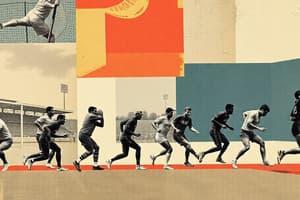Podcast
Questions and Answers
Quel est le rôle principal des organisations nationales et locales dans le sport?
Quel est le rôle principal des organisations nationales et locales dans le sport?
- Ils sont responsables de la promotion des événements sportifs internationaux.
- Ils établissent les règles et règlements sans les communiquer.
- Ils s'occupent de l'organisation et de l'administration du sport à un niveau inférieur. (correct)
- Ils financent les équipes professionnelles uniquement.
Quelle influence la commercialisation du sport a-t-elle sur le financement?
Quelle influence la commercialisation du sport a-t-elle sur le financement?
- Elle ne joue aucun rôle dans le financement des organisations sportives.
- Elle influence les stratégies de marque et le sponsoring. (correct)
- Elle a un impact négligeable sur les stratégies de marketing.
- Elle réduit l'intérêt des spectateurs pour les événements sportifs.
Quel est le rôle des organismes de gouvernance internationale dans le sport?
Quel est le rôle des organismes de gouvernance internationale dans le sport?
- Évaluer la performance des athlètes individuellement.
- Organiser des compétitions locales uniquement.
- Promouvoir uniquement les sports peu connus.
- Réguler et superviser les différentes disciplines sportives. (correct)
Quels bienfaits physiques le sport procure-t-il?
Quels bienfaits physiques le sport procure-t-il?
Comment le sport a-t-il été utilisé à des fins politiques?
Comment le sport a-t-il été utilisé à des fins politiques?
Quels sont les principaux problèmes éthiques dans le sport professionnel?
Quels sont les principaux problèmes éthiques dans le sport professionnel?
Comment le sport influence-t-il la culture et la société?
Comment le sport influence-t-il la culture et la société?
Qu'est-ce qui caractérise l'évolution moderne du sport?
Qu'est-ce qui caractérise l'évolution moderne du sport?
Quel rôle joue souvent les médias dans le sport?
Quel rôle joue souvent les médias dans le sport?
Quels types de sports sont classés parmi les sports d'équipe?
Quels types de sports sont classés parmi les sports d'équipe?
Flashcards
Organisations sportives
Organisations sportives
Les organisations nationales et locales sont responsables de l'organisation et de l'administration des sports à un niveau inférieur.
Sport professionnel
Sport professionnel
Le sport professionnel a évolué, attirant des investissements financiers considérables et l'attention des médias.
Commercialisation du sport
Commercialisation du sport
La commercialisation du sport a influencé les stratégies de parrainage, de marque et de marketing.
Spectateurs et financement
Spectateurs et financement
Signup and view all the flashcards
Doping et performance
Doping et performance
Signup and view all the flashcards
Définition du sport
Définition du sport
Signup and view all the flashcards
Évolution du sport
Évolution du sport
Signup and view all the flashcards
Avantages du sport
Avantages du sport
Signup and view all the flashcards
Impact social du sport
Impact social du sport
Signup and view all the flashcards
Gouvernance du sport
Gouvernance du sport
Signup and view all the flashcards
Study Notes
Definition and Scope
- Sport encompasses competitive physical activity, often governed by rules.
- It can include individual or team participation.
- Sport encompasses a wide range of activities – from individual pursuits like running to organized team games like football.
- The definition includes formal competitions, and informal recreation based on physical exertion.
History and Evolution
- Early forms of sport were often intertwined with religious rituals or cultural traditions.
- The development of organized sports emerged alongside societal advancements and urbanization, particularly in the 19th and 20th centuries.
- Rules and regulations are established to ensure fair play and competition.
- Modern sport is increasingly professionalized, leading to specialized training, and dedicated coaching.
- The globalization of sport has facilitated the exchange of ideas and talent across cultures, creating international competitions.
Physical and Mental Benefits
- Exercise, a fundamental component, improves cardiovascular health and strength.
- Sport encourages the development of physical skills and coordination.
- Participation in sport fosters a healthy lifestyle, leading to improved health outcomes.
- The discipline and focus required in sport can enhance mental fortitude and stress resilience.
- Teamwork and cooperation are significant values often learned and practiced through sport.
- Competition can foster personal development and resilience, including learning to deal with victory and defeat.
Social and Cultural Impacts
- Sport often acts as a unifying force within communities.
- Sporting events can generate significant social and economic activity, including fan gatherings.
- Participation can foster social inclusion and community ties.
- Sporting events are often viewed as occasions for national pride, fostering a sense of national identity.
- Sport can promote cultural exchange and understanding.
- Sports and media interactions are frequent and often play a large role in popularity and economic impacts.
Types of Sport
- Individual sports like tennis, golf, swimming, and cycling.
- Team sports like football, basketball, hockey, and baseball.
- Extreme sports like rock climbing and motorsports.
- Combat sports like boxing and mixed martial arts.
Governance and Organization
- International governing bodies, such as FIFA for football and the IOC for Olympic Games, oversee and regulate various sports.
- National and local organizations are responsible for organizing and administering sports at a lower level.
- Regulation maintains fair play between teams and individuals.
- A critical component of sport is the enforcement of rules and regulations and how these are communicated.
Professionalisation and Commercialisation
- Professional sport has evolved, attracting considerable financial investment and media attention.
- Commercialisation of sport has influenced sponsorship, branding, and marketing strategies.
- Spectator interest and engagement are important elements in the dynamics of funding and investment in sport organizations.
- Professional leagues, team owners, and fans are key stakeholders.
Sport and Politics
- Sports have been used for political purposes in various societies throughout history.
- Sporting events can be used to represent and celebrate national identity on various platforms.
- Examples include representing national pride through victories on the field.
Ethical Issues in Sport
- Issues of doping and performance-enhancing drugs are common concerns in professional sports.
- Fair play and ethical conduct are essential aspects of sport.
- Issues of corruption can arise in the governance of sport.
- The media plays a significant role in shaping public perception of sporting issues.
Studying That Suits You
Use AI to generate personalized quizzes and flashcards to suit your learning preferences.




